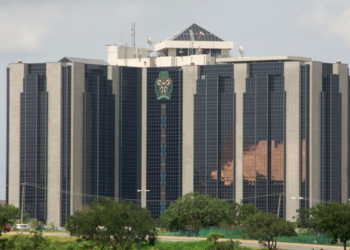The value of loans given to the private sector by Nigerian banks increased by N3.5 trillion –from N16.251 trillion in June 2019 to N18.632 trillion as at the end of May 2020.
This is according to data obtained by Nairametrics from the Central Bank of Nigeria. According to the data, this growth represents an increase of 21.53%.
READ ALSO: Why Warren Buffett’s company is buying shares of a gold mining company
Breakdown of loans
At the end of June 2019, a total of N15.13 trillion was given to the private sector. The figure increased to N15.61 trillion by the end of July 2019 before dropping to N15.56 trillion at the end of August 2019.
[READ ALSO: Banks’ loan to private sector increases by N3.47 trillion in 2019]
- Out of the total N18.63 trillion credit to the private sector in May 2020, the Oil and Gas industry (downstream, natural gas and crude oil refining) attracted N3.60 trillion.
- This was followed by the Manufacturing sector which attracted N1.99 trillion within the same period.
- The General Services segment also attracted N1.60 trillion in May 2020.
- The Finance, Insurance and Capital market segment followed with a N1.32 trillion credit.
- The Oil and Gas sector (upstream oil and gas services) attracted N1.29 trillion in May 2020.
- Trade and General Commerce attracted N1.25 trillion.
- During the year, credit to the private sector hit the highest in May 2020 at N18.53 trillion.
- On the other hand, credit to the government rose to the highest at N1.55 trillion in January 2020.
- A closer look shows that credit to government was at its lowest at N1,21 trillion by August 2019.
READ ALSO: Nigerian Banks issue N3.3 trillion in new loans in June 2020
Drivers of the credit
In the Central Bank of Nigeria’s Monetary Policy Committee (MPC) meeting communique, which included the personal statements of members of the apex bank’s MPC, Kingsley Obiora, Deputy Governor, CBN, stated that the credits were driven especially by demands from the manufacturing sector, consumer credit, general commerce, information and communication, and agriculture, among others. He said:
“Under the circumstances, the financial system has maintained a sound and stable position, following effective interventions by the CBN.
Download the Nairametrics News App
“Short-term interest rates continue to suggest some surfeit in the system with average Open Buy Back (OBB) and inter-bank call rates rising to 5.75 and 11.31% in June 2020, from 5.22 and 5.80% in May 2020, respectively.
“Non-performing loans (NPLs) decreased to 6.4% at the end of June 2020, compared to 9.4% in the corresponding period of 2019, reflecting recoveries, write-offs and disposals.”
READ ALSO: No trophy for International Breweries after bland Q2 results
An expert’s perspective
All things being equal, the total loans given by banks to the private sector should be more than the figures stated above. But all things are not equal, even as some credit experts have raised concerns about current realities of financial constraints faced by Micro Small and Medium Enterprises (MSMEs) in the country.
While speaking recently during a webinar by the Development Bank of Nigeria, Access Bank’s Group Head of Emerging Business, Ayodele Olojode, explained that MSMEs do not have regular and sustained access to finance at high-interest rates. This problem is coupled with lack of tangible collateral and economic conditions, which hamper their access to finance. She said:
“Risk-sharing facilities will help increase access to finance which helps MSMEs grow, increases employment and output in the economy.”
She further noted that the credit guarantee industry in Nigeria is still at a nascent stage, where the volume of guarantees and the size of the industry contributions to SMEs remain low compared to peers in other economies.
Note that a credit guarantee scheme provides third-party credit risk mitigation to lenders through the absorption of a portion of the lender’s losses on the loans made to MSMEs in case of default, typically in return for a fee.
In all, Credit Guarantee is the future because it will compensate for insufficient collateral, provide regulatory capital relief for banks, growth for MSMEs, increased economic GDP, and job creation.


















